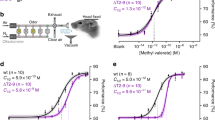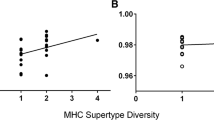Abstract
Major histocompatibility complex (MHC) genes confer individual olfactory identity that can be detected with exquisite accuracy by mice. The fact that MHC genes themselves generate the characteristic odortype, rather than dedicated odor-determining genes, was supported in studies of point mutations in H2K and HLA transgenic mice, which evinced distinct odor profiles in olfactory assays. In this article we provide further evidence for a central role of MHC genes themselves in odortype specification by demonstrating that mice that are unable to express their genomic class I MHC genes because they lack β2-microglobulin are distinguishable by scent from otherwise identical mice which possess an intact B2m gene. This odortype disparity appears at 9–12 days of gestational age, the period in which the MHC is first detectable in fetal cells of normal mice.
Similar content being viewed by others
Author information
Authors and Affiliations
Additional information
Received: 15 October 1999 / Revised: 30 December 1999
Rights and permissions
About this article
Cite this article
Bard, J., Yamazaki, K., Curran, M. et al. Effect of B2m gene disruption on MHC-determined odortypes. Immunogenetics 51, 514–518 (2000). https://doi.org/10.1007/s002510000165
Issue Date:
DOI: https://doi.org/10.1007/s002510000165




